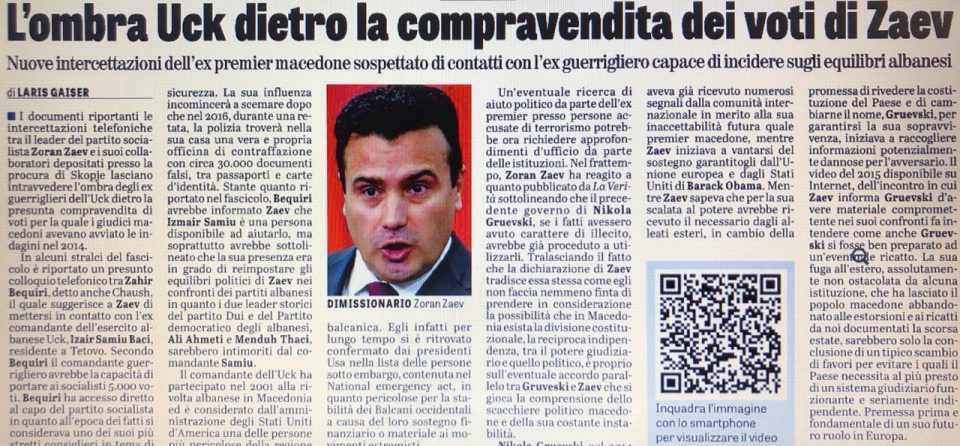Documents in the Skopje Public Prosecutor’s Office referring to recorded conversations between SDSM leader Zoran Zaev and his associates, point to the shadow of former UCK guerillas who are also behind the alleged electoral fraud investigated by Macedonian prosecutors in 2014.
In some excerpts of the files there is an alleged telephone conversation between Zahir Beqiri-Chaush, who suggest Zaev to contact former UCK commander Isair Samiu Baci from Tetovo. According to Chaush, the guerilla commander would have the ability to bring 5,000 votes to SDSM. Chaush has direct access to the SDSM chief, as at the time he was considered one of his closest associate in the security field. His influence begins to diminish when during a search in 2016 police found around 30,000 fake documents at his home, including passports and IDs.
According to what is reported in the files, Beqiri allegedly informed Zaev that Izair Samiu Baci is a person available to help him, and stressed that his presence could enable some Albanian voters to be won over DUI and DPA leaders Ali Ahmeti and Menduh Thaci, who would be intimidated by commander Baci.
The UCK commander, “La Verita” writes, participated in the 2001 Albanian uprising in Macedonia, and is considered by the US administration to be one of the most dangerous people in the Balkan region. In fact, in a long time he found himself on the US blacklist, contained in the National Emergency Act, as a dangerous for the stability of the Western Balkans because of his financial or material support to extremist movements.
The alleged prime minister’s request for political help from people accused of terrorism should now trigger a deepening of the investigation by the authorities. In the meantime, Zoran Zaev reacted to our publications, stressing that the previous government of Nikola Gruevski would have used it immediately if investigations had found any illegalities. With his statement he refutes himself because he does not even try to show that in Macedonia there is a division of powers between the judicial and the political, and the Macedonian political chessboard relies on precisely on the backroom parallel agreement between Gruevski and Zaev, with its constant instability, writes “La Verita”.
Nikola Gruevski even back in 2014 began to receive numerous signals from the international community that he was not wanted as prime minister in the future, while Zaev began to boast of support from the European Union, the United States and Obama. While Zaev knew that for his coming to power he would get enough from the European allies in order to change the constitution and the name, Gruevski, in order to guarantee his salvation, began gathering information with the potential to harm the opponent. A 2015 video available online, from a meeting where Zaev informs Gruevski that he has compromising materials, proves that Gruevski was very well prepared for possible blackmail.
His escape, unhindered by any institution that left the Macedonian people alone against the blackmail and pressure we published last summer, is just an epilogue to a typical exchange of services that if wanted to be avoided, the state must urgently establish a functioning and independent legal system. A first and vital condition for the future of the state in Europe, Gaiser concludes in the third sequel to the “electoral fraud in the 2014 elections” affair.





Comments are closed for this post.